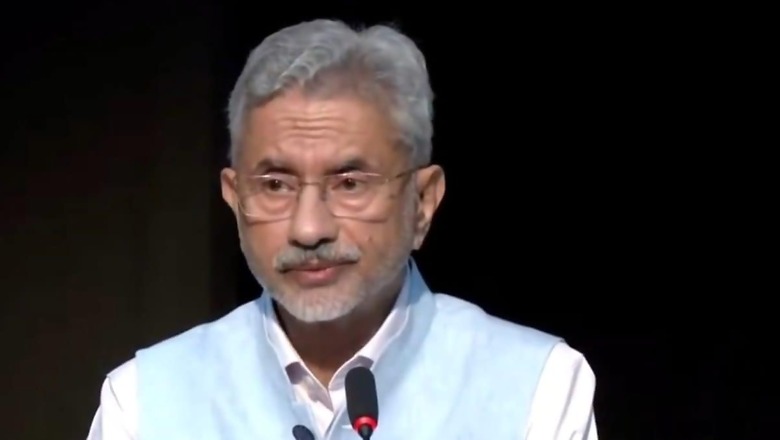
views
External Affairs Minister S Jaishankar, who is scheduled to visit Pakistan to attend a conclave of the Shanghai Cooperation Organisation (SCO) in mid-October, on Saturday ruled out the possibility of a bilateral meeting between the two countries, saying that his visit would not cover any talks between the two countries.
“The visit will be for a multilateral event. I’m not going there to discuss India-Pakistan relations. I’m going there to be a good member of the SCO. But, you know, since I’m a courteous and civil person, I will behave myself accordingly,” EAM Jaishankar said.
#WATCH | Delhi: On his upcoming visit to Pakistan to attend the SCO summit, EAM Dr S Jaishankar says, “…It (visit) will be for a multilateral event. I’m not going there to discuss India-Pakistan relations. I’m going there to be a good member of the SCO. But, you know, since I’m… pic.twitter.com/XAK2Hg3qSX— ANI (@ANI) October 5, 2024
The External Affairs Minister also slammed Pakistan for the stalled progress of the South Asian Association for Regional Cooperation (SAARC), saying, “At the moment, SAARC is not moving forward, we haven’t had a meeting of SAARC for a very simple reason – there is one member of SAARC who is practising cross-border terrorism at least against one more member of SAARC, maybe more.”
“Terrorism is something which is unacceptable and despite a global view of it if one of our neighbours continues to do it – there cannot be business as usual in SAARC. That’s the reason why the SAARC meeting has not happened in recent years – but it doesn’t mean that the regional activities have stopped. In fact, in the last five to six years, we have seen far more regional integration in the Indian subcontinent,” he said.
#WATCH | Delhi | EAM S Jaishanka says, “At the moment SAARC is not moving forward, we haven’t had a meeting of SAARC for a very simple reason – there is one member of SAARC who is practising cross-border terrorism at least against one more member of SAARC, maybe more… Terrorism… pic.twitter.com/ILGuy7ZTXe— ANI (@ANI) October 5, 2024
Also speaking for the Sardar Patel lecture on governance, organised by IC Centre for Governance, EAM Jaishankar said, “Sardar Patel opposed to going to the United Nations. He had resisted this in the case of Junagarh and Hyderabad. He was very clear that India shouldn’t submit its issue to the judgement of the other powers. Sadly for all of us, his caution was disregarded.”
“What began as the ‘Jammu & Kashmir question’ was conveniently changed to the India and Pakistan question. His reluctance to take the matter to the UN itself came from the belief that it was better to deal directly with Pakistan rather than a framework that would allow Pakistan to manipulate. Like any other neighbour, India would like to have good relations with Pakistan but not by overlooking cross-border terrorism. As Sardar Patel demonstrated, realism must be our foundation of policy,” the External Affairs Minister said.
#WATCH | Delhi | At the Sardar Patel lecture on Governance organised by IC Centre for Governance, EAM S Jaishankar says, “Sardar Patel opposed to going to the United Nations. He had resisted this in the case of Junagarhn, Hyderabad. He was very clear that India shouldn’t submit… pic.twitter.com/6D3cPehWgb— ANI (@ANI) October 5, 2024
Jaishankar also slammed the policies of Jawaharlal Nehru, India’s first Prime Minister, Jaishankar said, “India’s relationship with China is similarly an issue on which the Sardar Patel instincts are on record, and they differ considerably from that of Prime Minister Nehru. The most cited example was, of course, that famous exchange of correspondence in 1950 on this matter.”
“In Patel’s view, India had done everything to allay China’s apprehensions, but that country regarded us with suspicion and scepticism, perhaps mixed with a little hostility. He highlighted that for the first time, India’s defence had to concentrate on two fronts simultaneously. His assessment was that China had definite ambitions and aims that shaped its thinking about India in a less-than-friendly way.”
“Pandit Nehru, in contrast, referred to China’s protestations of friendship and warned against losing our sense of perspective and giving way to unreasoning fears. To him, it was inconceivable that China would undertake what he called a wild adventure across the Himalayas. He did not. And again, these are his words. This is a key aspect of government because if you start with a missed diagnosis, everything else thereafter only takes us in the wrong direction,” EAM Jaishankar said.
SCO MEETING IN PAKISTAN
Pakistan is hosting the SCO Council of Heads of Government (CHG) meeting on October 15 and 16, and India on Friday announced that S Jaishankar will travel to Pakistan for the SCO Summit.
It will be for the first time in nearly nine years that India’s external affairs minister will travel to Pakistan. The last Indian External Affairs Minister to visit Pakistan was Sushma Swaraj. She had travelled to Islamabad in December 2015 to attend a conference on Afghanistan.
The announcement on Jaishankar’s visit was made by External Affairs Ministry spokesperson Randhir Jaiswal, and the spokesperson clarified that the External Affairs Minister is travelling to Pakistan only to attend the SCO summit.
In August, Pakistan invited Prime Minister Narendra Modi to the SCO’s Summit.
Jaishankar’s visit to Pakistan assumes significance as it is seen as a major decision on New Delhi’s part.
The decision to send the senior minister is seen as a display of India’s commitment to the SCO which has been playing a key role in boosting regional security cooperation.
INDIA-PAKISTAN TIES
The ties between India and Pakistan came under severe strain after India’s warplanes pounded a Jaish-e-Mohammed terrorist training camp in Balakot in Pakistan in February 2019 in response to the Pulwama terror attack.
The relations further deteriorated after India on August 5, 2019, announced the withdrawal of special powers of Jammu and Kashmir and the bifurcation of the state into two union territories.
Pakistan downgraded diplomatic ties with India after New Delhi abrogated Article 370.
India has been maintaining that it desires normal neighbourly relations with Pakistan while insisting that the onus is on Islamabad to create an environment free of terror and hostility for such engagement.
Pakistan’s then Foreign Minister, Bilawal Bhutto Zardari, visited India in May 2023 to attend an in-person meeting of the foreign ministers of SCO nations in Goa.
It was the first visit of a Pakistani foreign minister to India in almost 12 years.
INDIA’s ASSOCIATION WITH SCO
The SCO council of heads of government conclave is the second-highest platform in the grouping. The SCO heads of state summit is the top forum in the grouping that is generally attended by the Indian prime minister.
The SCO, comprising India, China, Russia, Pakistan, Kazakhstan, Kyrgyzstan, Tajikistan and Uzbekistan, is an influential economic and security bloc that has emerged as one of the largest transregional international organisations.
India was the chair of the SCO last year. It hosted the SCO summit in the virtual format in July last year.
India’s association with the SCO began in 2005 as an observer country. It became a full member state of SCO at the Astana summit in 2017.
India has shown a keen interest in deepening its security-related cooperation with the SCO and its Regional Anti-Terrorism Structure (RATS), which specifically deals with issues relating to security and defence.
The SCO was founded at a summit in Shanghai in 2001 by the presidents of Russia, China, the Kyrgyz Republic, Kazakhstan, Tajikistan and Uzbekistan.
Pakistan became its permanent member along with India in 2017.




















Comments
0 comment